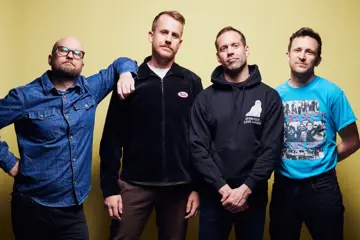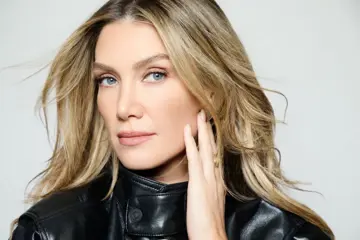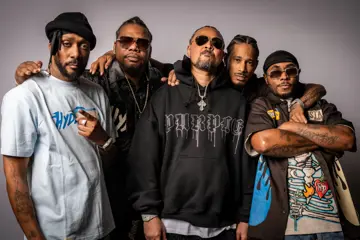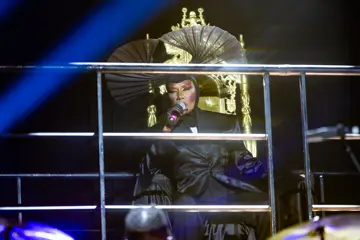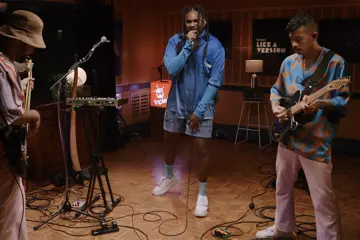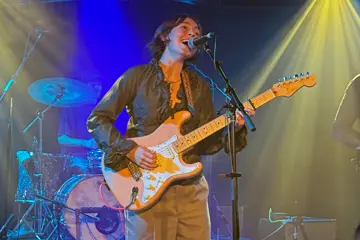After celebrating the success of his debut record, DAN CROLL found himself at a crossroads. Considering himself an amateur when it comes to creating music professionally, he's had a lot of choices to make with his second record, not only because of his experience, but due to the fact that he was almost left with nothing.
Just last year, he was dropped from his label and found himself with no management and basically no way to release his second record. This was after the release of single 'One Of Us' which features on his second record Emerging Adulthood. Turning it all around, Communion Records came to the rescue after he'd had the opportunity to release a few singles through them earlier.
And from that period, Emerging Adulthood came to fruition.
Yes the record was borne out of difficult times, but it's not necessarily centred on that alone. Reflecting its title, Dan's really used this record as an opportunity to navigate the various intersections of his creative and personal lives that clashed over the last few years. Mental health and discussions of it are prominent, but in a way that is not invasive or exposing and actually invites you to relate to it.
He's found a way to confidently juxtapose the real and fraught meaning in his lyrics with the danceable, contemporary nature of the sound to create a narrative that is both cohesive, true and bold.
Don't miss a beat with our FREE daily newsletter
It's rare for a male musician to be so frank about what they're feeling with their fans, and what is even more rare is the fact that he is so willing to be upfront and offer his own personal support to fans - as evident with his Dial Dan exercise (where fans could actually call him and chat to him); one he uses to be able to engage and connect on a personal level with these people.
Dan Croll is a rare breed - one of those artists you only come across once or twice a generation. Not only is he bold in instigating conversations that may otherwise seem quite taboo in popular music, he's also breaking down the barrier between artist and fan that really makes us feel like as people, they're unattainable.
Dan just wants to be everyone's friend, which is why Emerging Adulthood feels like more than just a second record. It feels like a call to arms; an encouraging simultaneous message of despair, sadness, growth and courage.
I was lucky enough to sit down face to face with Dan to chat about mental health, support, creating a cohesive record and being a tangible musician in 2017.
You’ve just released your second record, Emerging Adulthood. How do you think the creative process behind this record differed from your debut?
It was very different on purpose, I think. I get itchy feet quite quickly, so once I’ve done one thing, I want to do another thing in a different way. I finished that first album, which was me playing quite a few of the instruments, but still had a lot of people around me, a lot of friends coming through the studio. It was done in a kind of old school gym; it was a little bit DIY with begged and borrowed equipment and that process was really fun, but once I got to the end of it, I was like, ‘That’s cool.’
I got to the second album and I wanted to do it the complete opposite way just to see for myself how it differs and how I’d find it. This one was a lot stricter and a little bit more, I guess, professional in a way with the big studio. I set myself some goals that all of the songs had to be written within six months and recorded in two months outside of the UK and I had to play every instrument on it, so I had these clear aims. Whereas the first album was just a bit like, "Let’s do an album." It was a mix of songs that were three or four years old, so I wanted everything on the second album to be within the same time period.
With the first record, it’s all about experimentation and finding what works for you.
Exactly, and a lot worked, some things didn’t, so it was really cool to be like, "Alright, I’m gonna go for this again."
As you mentioned, you played pretty much all of the instruments on the record. I read in an interview that you like to challenge yourself in terms of finding ways to do that. What else do you like to challenge yourself with during the writing process?
The instruments was the main one. I think for me, that six months writing was really tough for me because I've always been quite a slow song writer. I’ve got a terrible habit of writing half a song and then getting distracted and then writing another half a song, and I end up with like 30 half songs. This time, it was like, "I’ve only got six months, I can’t mess about & I can’t just be leaving songs half done." So for me, the songwriting was a lot stricter and a lot tougher, so it was quite a challenge to see a song through until the end and then start another one.
The album itself is a really poignant display of cohesive lyricism & the incredible musical knowledge that you possess.
No one’s ever said that to me so I’m happy right now.
That’s personally what I got out of it, you've probably heard a million other things from a lot of people.
Cohesive is a word that I’ve always longed for to be honest. The first album was so sporadic, and had songs that like I said, were three or four years old, a lot happens over four years. Songs are very different, and I got pinned quite a bit in the reviews about that, and probably myself, read too much into that so that was why - with the second album - I set those limits because I was like, "I want it to be cohesive and I want it to be consistent."
Well I think you’ve definitely achieved that. In reference to your catalogue of music that you’ve both released and not released, what do you think this particular record represents?
I think just more mature stuff to be honest. I had to step up, personally, out of a pretty horrible place beforehand to get myself to do a second album, and so this is the most real or raw music that I’ve made because it is quite personal, lyrically. The first album, a lot of it is just, I look back and it’s very kind of basic songwriting where it’s about relationships and love and all of that. Whereas, I think this record is a bit more real. It’s about stuff that was really going on and what I was going through at the time, so I think it’s quite raw.
I think it’s hard with the first record - you’re still finding your feet. I feel like I would draw from things that I know and listen to, and I think that’s obviously something you’ve done with the first record. But with this record, you’ve really tried to step outside of that and become more of your own artist. What I got from the record was a real journey of self-discovery and an admittance of your own flaws and finding ways to navigate that. How do you think you’ve grown as a person creating this record?
There’s still a lot of flaws to be fixed. I’ve come a long way I think. I think just having this album as an outlet for all of that has been a big thing. Some of the things that I was going through - feeling quite depressed, anxious and paranoid about a lot of things that are not actually spoken out about - so having this as a vehicle to talk about those things and get that across actually has made me feel less depressed and less anxious. That basic thing of talking or singing about them has been a really big thing for me.
Cathartic.
Yes, definitely.
I read in an interview that you were saying that you didn’t want this album to make people feel depressed and that it’s very personal. Do you think that being open about your mental health on a record like this has has allowed you the opportunity to heal?
Yeah, I realised quite early on in that writing process that I wasn’t in a good way and that this album had the potential to be quite negative. At the same time, I didn’t want to lie or be untruthful. I wanted to still get those things across. It was incredibly important to try and wrap them in quite an uplifting way. It was talking about negative things but at the same time, the music, the production, the chords, the rhythm, I was trying to make that more uplifting and positive so people can connect but at the same time by the end of the track, they can feel a bit better about connecting to that kind of stuff. So, that was incredibly important to me.
I think it’s really cool that you found a way to balance that though. I think it would be really easy to write music that makes you feel sad, but also sounds sad too.
Yeah, I started getting really paranoid. I felt very responsible for a group of people, my fans, and I still felt very responsible for what they were about to hear in a way and so I didn’t want anything to be taken in the wrong way or anything like that, so I was like, "Okay, let’s try and do this negatively-positively." It was weird.
Has it been kind of difficult navigating that? I feel like that would be a very new found thing for you - having such a big fan base that is so diverse. Has it been hard creating music that’s true to yourself but also isn’t invasive?
I guess it has. That’s tough, there’s certain directions that I’ve ditched - like from the first album. People still kind of ask about those things, but I’ve had to tell myself a lot of times and come to the realisation that you’re never going to please everyone. And that’s a tough thing if you’re a bit of perfectionist like me. When you have to try and make yourself realise and believe that you’re not going to please everyone, it can be kind of tough but I think I’ve kind of hit that. There’s still a mix of genres in there, maybe less so than the first album, but I’ve been trying to hone it in a little bit more and be more direct with the sound and stuff. I think I’ll continue doing that. I feel like I’m working backwards in a way.
It’s a two steps forward, one step back kind of thing.
Yeah, I feel like I’m just walking to be honest. I see a lot of songwriters that start very honed in and are very direct, and then kind of spread out and go explore different sounds, whereas I think it’s because I see myself as quite an amateur still - I’m still very new to the industry. I only started out when I was like 18, 19 and other people have been writing music since they were like five. I feel like a real newbie still. I’m still trying to find my place in the industry I guess.
As someone who’s grappled for years with my own mental health, personally and with my family, I think it’s really uncommon to hear it being talked about in music. Even in the last year, there are only a few releases that come to mind that focus on mental health and kind of evoke those feelings, but I think it’s really cool that you’ve found ways to put that into words that work not only for your audience, but for you as well. Is that something that you set out to achieve, or did you find that tended to come more naturally as you were writing?
A little bit of a mix to be honest. I think I started writing the first few songs, and then made that realisation of, "These songs are quite personal, a little bit negative." Then I was like, "Okay, if this is what it’s going to be then I need to be sure of how I’m going to achieve this in a kind of delicate way," because mental health is a taboo. It should be talked about, but it is still so delicate. You have to be careful how you approach it. So I just tried to do it as direct as possible, but also quite calmly I guess. That’s why we’ve also set up the Dial Dan hotline which means I can talk to people directly over the phone about it and be there for them with that stuff.
I was going to ask about that - it’s cool that you’re not only using your platform to create music that’s powerful, but you’re also connecting personally with your fans. How does it make you feel to really have the capacity to be able to connect with your fans on such a personal level?
It feels amazing. I was feeling really down about that kind of stuff and how the whole hotline thing kind of evolved, and I was feeling so fed up with spending like five or six hours a day on a laptop trying to connect with fans. I was on Facebook, Twitter, Instagram, just constantly replying to messages and you know, you’re thinking about what you’re typing, and then typing it all and you’re just talking to this laptop. I felt no closer to my fans. I didn’t feel like I was getting to know them, or that we had any kind of relationship because it was just a laptop. It really started to get me down, and I became kind of exhausted by it as well because I wasn’t leaving the house a lot. I was just kind of indoors on my laptop, alone and so my label and my manager kind of intervened and were like, "We need to fix this, it’s not healthy." So we ended up just going to the pub and thinking about ways that we could change that up to be more direct, and someone joked that I should just give out my phone number. We all laughed, and were like, "Hang on, that’s actually a good idea." So we thought if we could just buy a burner and just turn it on maybe one week every month, and give out the number so people can just call, it’s as direct as you want it to be. It’s been absolutely amazing. We’ve done five rounds of it so far and it’s been really enjoyable. It’s taken the burden out of social media for me and it’s brought this whole new relationship with fans where I can really get to know them.
On the American tour last month, I’d been speaking to some people on the phone about issues like mental health, positive things, negative things, a real mix. And then, I’ve suddenly gone out to the States and on tour, I met a few of them. And it’s great to be able to be like, "Oh! That’s you! How’s that going? How’s that going?," and it makes you feel great. They feel great because you’ve remembered and you’re talking about it, seeing how it’s developed and seeing how they’ve chosen to fight it, see how they’re dealing with it. I feel this is how it has to be now in music. It’s never been so divided as I think it is now where you can either be untouchable or you can be so intangible that the fans never get to meet you, never get to see or speak to you and it’s just this star. Now there’s this huge gap where suddenly, you’re the artist who is so there for your fans. I feel like you have to be now. It was a really good way of being super direct with them and getting to know them.
Do you think the impact this exercise has had has changed the way you approach your live shows?
Live shows have always been - before the hotline - they were always my way of doing that. I’ve never played a show and not stood at the merch table after and waited until everyone’s gone home. No matter where we play, no matter what gig or festival, I always go to the merch straight after the show and I don’t stop until everyone who’s wanted to speak has spoken, so that’s always been there and that’s always been my chance. But now it’s an extra opportunity to kind of talk about the things we might have spoken about on the phone and I think gigs for me are just relaxed anyway. I think when I perform with the band, I don’t want there to be a big divide between the performer and the listener. Even though there might be a metre or two in between, I want them to still feel very involved in it. Between songs we talk, it’s all very genuine I guess.
You obviously would have had people contact you from places you haven’t been able to visit yet. Has Dial Dan been a great way to connect with them?
That was a big one for me. I get sad that I can’t get to these people, but that’s obviously just the way it is. But to finally have that outlet to speak directly to people who might still not get the chance to ever see me - I might not get to go to that small of a village somewhere. The likelihood is that some people will never get to see the live show, but they’re so dedicated to watching it on Youtube and following sessions - and I love them for that. Now there’s this kind of extra hand in just being able to speak with them and they know that, and you can talk about it and let them feel okay about it now.
I think maybe before on social media, people don’t think about what they’re writing, it’s that kind of trolling way that social media has evolved into and you maybe get fans who are a bit edgy or angry that you’re not coming to certain cities or not coming to certain countries, and it’s tough to tell them on social media that it’s expensive and I’ve got to provide for eight guys. I’ve got to fly them and pay them, it’s so expensive. I’m just unable to do it - you’re just one person, but I need thousands to justify it. It’s tough to explain on social media, but when you’re speaking directly to them on the phone it’s far more calm, and they can tell and they understand - you’re back on a level playing field. It’s really nice to be able to give them that attention.
Connection and authenticity in a genuine way seem to be important to you not just within your music, but just in general. Is that something that you’re conscious of?
Yeah, I hate middle men. I hate bullshit. That’s like my two things.
The industry is so rife with it too.
It really is. I’ve had to really evolve and mature really quickly since the first album, since being dropped, losing labels, losing managers, being completely left alone. I’ve had to suddenly grow up very quickly and assess what went wrong, what I should have done, what I shouldn’t have done, stuff like that. So now, I have no time for that. I know the industry is full of it. There’s still challenges along the way, but I just want to cut all of that out. I no longer want to be seen as a musician who is intangible and who is on a pedestal - I want to be welcoming to everyone and be on a level playing field.
I think that’s really cool that you say that because just in society as a whole, men talking about their mental health, particularly in music, is just such an unheard of thing. The fact that you’re willing to do that and talk to your fans about is almost unheard of.
Yeah, definitely. I think in the last few years I’ve become more aware of people around me - my friends, female and male, but especially male friends that are struggling with it as well and unfortunately there are people who have taken their lives because of it who were close to us, so it’s been a bit of an eye opener. There’s a very small music scene back in Liverpool, so we’ve all kind of suddenly taken this approach, trying to talk to other people about it, diversify it.
Back to the record, it’s such a weird climate at the moment because I feel like everyone’s opting for shorter releases - EPs and singles - but putting them out more frequently. You seem to be sticking to LPs which I think is really cool, but do you find that this is something that you’re constantly having to grapple with?
I’ve been speaking about this for the past couple of days with my manager and other people. I’ve never talked about the subject more - in a good way - and I think it’s really interesting where things are at the moment. I don’t know really where I stand on it because I see the benefits to both, not just from my point of view, but from the label’s point of view too. I understand LPs and shorter release times, as well as from the fan’s point of view. There’s so many ways of doing things now, I feel like it’s a really exciting point in the music industry now. I’m going to be finishing this second album run tour/promo into mid next year, and then I guess I’ll have to face these choices of what I’ll be doing with the third album and what to take from there.
The reason why it kind of came up in conversation was because whilst I was on the road in America, I really tried hard for the first time ever - because I never write on the road, it’s always when I’m home. I really needed to push myself to write on the road. So I ended up writing around five tracks I was really happy with, that are very much like country-Americana, stuff like James Taylor who I absolutely love, very kind of different to where my music is going. And so I was like, "It’s cool now that I’ve done it, but what do I do with it and what use is there for it?" Because I would like people to hear this because I would like people to hear me differently as a songwriter - I don’t just do electronic stuff, I do acoustic stuff too. So this is where we all started talking about it and that whole thing of it being released as an EP. I think maybe a year or two ago, should I have done that, people would have really turned their noses up at it and I think I would have been badly reviewed for it, of people being like, "How has he gone from an electronic sound to that?" I think now, it’s far more welcoming. People are putting out more music than ever, more consistently, more experimentally and more collaboratively. I think now, it’s a very welcomed thing so I feel more confident doing something like that. This is kind of how it should be - I like the idea of going back to 7” and EPs like that.
I get the album, it’s cool. Especially if it very much has a strong theme or cohesiveness to it, that’s when an album is great. But I feel like if you’re just documenting journeys and experiences, then the more frequent the better. I’m still kind of deciding on what to do with how I approach a third album. It’s been interesting.
I think there’s definitely been a real shift with not only listeners, but the media and music industries as a whole were kind of like, "If you release something, it’s going to be attached to everything else you’ve released." I think it’s very much now becoming, "Oh, this person’s doing this now! Maybe they’ll come back to that sound on their next release."
It’s mad to me because for me, I’m a songwriter, but I know I’m producing music that sonically sounds like a band, it feels like a live band. But at the end of the day, I’m still a songwriter and if you look at great songwriters in the past, they were just putting out so much music, so many albums. And everything was changing. Songwriters went from folk to funk to country to all of this stuff, and it’s like of course, how did it get to the point where we were looked at badly for changing musical styles and directions quickly?
I think it’s really cool and to be honest, there might have been people before, but the one that I know of is Oh Wonder, they’ve been doing one track a month. Fans are super happy, they know when things are coming, they’re getting new music every month and I get it takes a bit more money from the label point of view to do a bit more marketing that you’re spending on every song rather than just a bunch of singles, but still, I think it’s really cool.
It’s a cool way that the industry is heading in terms of labels ditching that traditional model of being signed for six albums, then you release six records and that’s it. It’s competitive and I think everyone’s really trying to capitalise on that now.
I think there’s a lot of pressure on artists as well, you mentioned that typical deal where you sign your rights way for six albums and there’s a lot of pressure to build these big blocks of music. Whereas now it’s just like, "Oh yeah, this is cool."
Just roll with it. I wanted to ask to wrap this up, obviously you’re still very new to the music industry, but you’ve done so much in such a short time. What advice would you have to give to up and coming musicians?
I still feel like the bottom line is gigging. I go back home to Liverpool, and people who’ve started bands come up to me and ask what they should do and I still think gigging is so important. I seem to slate social media - I love social media, I do get what it’s for and what it’s worth - but at the same time, it’s not the be all and end all and I think that up and coming musicians sometimes [put] so much money into sponsored posts rather than playing gigs, and it’s just like no. No, it’s not how it goes.
There’s a few bands, when I’m back home and on my laptop, who I just seem to get hammered with sponsored posts from. So I’m like okay, I’ll give in and check out your page and see what’s happening, and there’s no gigs listed, no way of seeing them live, no way of buying their record. It’s just sponsoring for the sake of sponsoring and social media has become this thing of trying to put people on platforms visually and kind of falsely. I just believe the bands that just slog it and gig are the ones that last the longest. Gigging is so important.
Words by Caitlin Medcalf
SEE MORE




